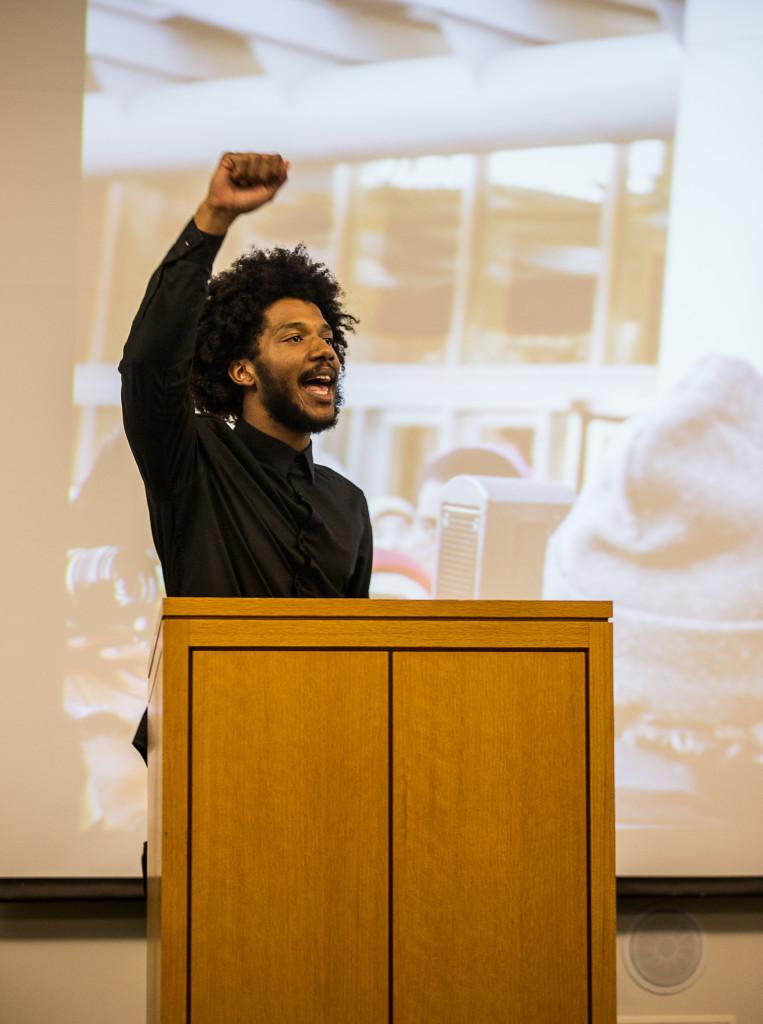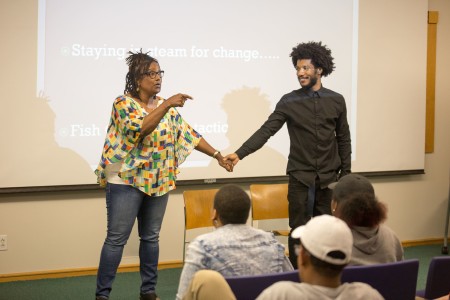Nora Coghlan, News Editor
coghlann17@grinnell.edu
“Let my people go, set my people free, I’m letting my people know I love you like you were me,” chanted Black Lives Matter activist Damon Williams ’14 and a crowd of students, faculty and staff in a packed ARH 302 on Thursday night. Williams, co-chair of Black Youth Project 100’s Chicago chapter and co-founder and co-director of the Let Us Breathe Collective roused Grinnellians in a two-part discussion and workshop highlighting the intricacies of racialized state violence, alongside Professor Kesho Scott, Sociology, and Professor Shanna Benjamin, English, both of whom returned to campus just for the event.
Drawing on his intersectional approach to activism, Williams outlined the various factors contributing to racialized violence, including a different understanding of the idea of violence itself.
“We often think of state violence as solely that police bullet going into a black body, and that is probably the most egregious example, but it is rooted in a system that is widespread and sometimes not as visible,” Williams said. “Deprivation is violence.”
Williams also outlined the history of American police, exposing the inherent flaws in the institution itself that have led to its systematic violence against black people.
“The first agent[s] of the state that was given a badge and given the power to use force were slave patrollers — that’s not a metaphor,” he said. “That is the legacy, that is where state-instituted authority came from.”

In light of the system’s inescapable flaws, Williams, and the organizations he represents, calls for abolition of the institution of police.
“I believe that prisons and police are inherently destructive forces that criminalize communities and make them more separate from our economic activities and put them outside the labor market … [they] should be abolished,” Williams said. “They only have the power to arrest people, to deprive them of their physical freedom; to fine people, to deprive them of resources, and [to use] physical force. Police cannot keep us safe by definition. They do not have the power to. Guns, cages and fines cannot end drug addiction. Guns, cages and fines cannot end domestic disputes. Guns, cages and fines do not stop homicides. Guns, cages and fines do not cure mental health issues.”
While much of the dialogue focused on the role of the police and the state, Williams insisted that these issues are part of a larger system in which individuals all play a role.
“We talk about the state and the federal government or even local politics as this thing that is above us, something that is behind in a dark room, but at least as it is written in our society, the state is the public, the state is people. The state is you. An elected official is the collectivization of your individual power,” Williams said, calling for the audience to interrogate their role in the system. “Once the police are killing somebody, they are doing that in your name, that’s not separate from you.”
Following his initial talk, Williams was joined in his conversation by Benjamin for a conversation on framing the movement and later by Scott for a workshop on understanding social movements more broadly.
Students joined the conversation by asking Williams for tips on how to further the movement in Grinnell, citing examples of pushback from the administration in the recent decision to cut ties with Posse and the erasure of #BlackLivesMatter images spray painted on campus last December. Williams encouraged students to continue fighting for accountability.
“[The administration’s] backs are against the wall and y’all can continue to elevate and escalate the pressure you’re putting on them and you can make sure that you are at the table, and [that] what they say that they’re going to do, they do it,” he said.
Turning it back on the audience, Williams urged students to examine their activism and their role in discourse.
“I want to challenge you a little bit, because unless you are actively trying to change that power dynamic we are all part of the problem. Liberal is not an accomplishment. Saying that you are liberal is not some end goal. … Liberalism is still rooted in a system that tries to deny that this is happening. Liberalism still benefits from these processes, and they are the type of processes that still necessitate the need for the type of good that you are trying to do anyway,” Williams said. “If your work is not addressing the power dynamic or actually repairing the harm done to the people who are victims to these systems … then you are unfortunately part of the problem.”

Benjamin echoed Williams’ sentiments, and hoped that his conversation would encourage the campus community to engage in discussions about the “isms” that are at play in Grinnell.
“My experience has been that Grinnell idealizes itself in ways that can undermine the work required to really have an inclusive campus, and … individuals are [unwilling] to be self-reflective about how they’re breathing an air that is imbued with racist, sexist, patriarchal … tendencies. This is the air we breathe, but folks want to act like it’s not because, ‘I’ve come to Grinnell and I’ve made a choice to be liberal and I pursue a social justice mission,’” Benjamin said in a later interview. “If you can’t be real with yourself about your preconceptions and the expectations that you place on persons of color, minoritized communities, expecting them to do the work of fighting white supremacy when they weren’t the ones to create it. This has to do not with the policing of black bodies but many times about how majority communities manage one another and to what extent they are willing to engage in difficult conversations with classmates, with people they think they’re friends with and to get real about how embedded these ideas are in our psyches and I think once we get clear on that, that’s a starting place.”
























































